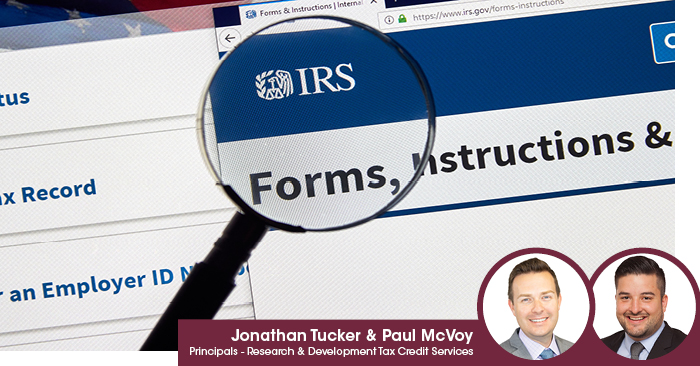Follow KBKG on Social Media
By Jonathan Tucker and Paul McVoy | Principals – Research & Development Tax Credits
The One Big Beautiful Bill Act (OBBBA) established that eligible small businesses may fully deduct domestic research costs capitalized in 2022-2024 via amended return. The problem is there’s currently no clear guidance from the IRS on how to make this election, what documentation is required, or whether taxpayers can make the election on an originally filed return, which is critical because many 2024 tax returns haven’t been filed yet.
Without IRS guidance, many taxpayers and practitioners are left in limbo.
In a formal letter dated July 31, 2025, the AICPA urged the Treasury Department and the IRS to issue immediate guidance under the OBBBA that would allow eligible small businesses to fully expense domestic R&D costs incurred in 2024.
Specifically, the AIPCA has recommended allowing:
- Immediate Expensing on original 2024 Returns
Eligible small businesses should be allowed to deduct their 2024 domestic research costs on their originally filed return by including a statement referencing the election. - Retroactive Application to 2022 and 2023
Taxpayers should be permitted to amend prior returns (2022 and 2023) to deduct research costs incurred in those years or elect to file an accounting method change for or its first taxable year beginning after December 31, 2024, to deduct the 2022 and 2023 costs. - NOL Carryforward Relief Without Amending the NOL Year
If the election has affected a year in which the taxpayer reported a net operating loss (NOL), the taxpayer is allowed to adjust the NOL in the carryforward year(s) instead of amending the original NOL year return.
KBKG Insight
The AICPA’s recommendation is both timely and necessary to avoid administrative headaches for small businesses and practitioners. However, the request introduces a technical issue that warrants attention. Specifically, if taxpayers are permitted to deduct 2024 R&D expenses directly on their originally filed return, it raises a potential conflict with the ongoing amortization of 2022 and 2023 R&D costs, which are still required to be capitalized and amortized under existing rules. This would result in two different accounting methods being applied on a single return: deducting current-year R&D while amortizing prior-year expenses. Without clear guidance from the IRS addressing this issue, practitioners face uncertainty around whether making the election for 2024 will also impact treatment of previously capitalized costs from 2022 and 2023.
This guidance is time sensitive. Without it, taxpayers may feel pressured to capitalize costs unnecessarily, or worse, file returns under the wrong method and face future compliance issues. The AICPA also warns that retroactively applying the election without clear procedures could create avoidable administrative burdens for both taxpayers and the IRS.
Conclusion
For CPAs, the time to prepare is now. Those who work with small business clients engaged in domestic R&D should stay tuned for guidance, and prepare to act quickly if the IRS issues favorable procedures. This could mean:
- Updating current year 2024 return positions,
- Amending 2022/2023 returns, or
- Adjusting NOL carryforwards without triggering amended return filings.
CPAs, tax preparers, and businesses are encouraged to contact a KBKG expert today to learn more about how to proceed with claiming and maximizing the R&D Tax Credit under the new tax legislation.
About the Authors
Jonathan Tucker | Principal – Research & Development Tax Credits
Jonathan Tucker is based in Atlanta, GA, and has over 20 years of experience providing federal business tax advisory services, primarily in R&D tax credits, to clients in various industries including technology, manufacturing, transportation, healthcare, retail and consumer products, hospitality, media and entertainment, financial, and other professional services industries… Read More
Paul McVoy | Principal – Research & Development Tax Credits
Paul McVoy is a Principal for KBKG’s Tax Credit Consulting practice. In this role, Paul devotes his time to consulting companies in maximizing their R&D tax credit claims. Prior to joining KBKG, Paul was a manager at a Big Four accounting firm out of the Philadelphia, San Diego, and Los Angeles offices. Paul McVoy has spent nearly 20 years in public accounting, leveraging previous tax compliance… Read More




